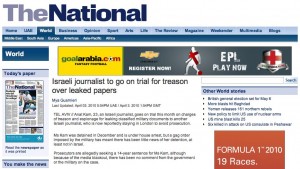Publish and Be Detained
Somewhere in Europe, Sonya Mousa is breathing a sigh of relief.
Or so I’m guessing. I’ve never met or spoken with Sonya Mousa. But, last week when I was wrapping up my coverage of the Anat Kam case and thinking about using a pseudonym, this was the first name that came to mind.
I’d been monitoring Kam’s situation for quite some time. I watched blogs and tweets about it go up, only to be pulled down, for the past month. When the JTA followed in blogger Richard Silverstein’s footsteps and broke the story in English, I contacted my editor at The National. “It’s a risk,” I told her, “but let’s do it.”
That was Monday. The section I write for runs on Saturday. I figured I had a few days to decide what to do about the byline.
I asked my editor if we could go without one, and she said no. But they could offer me the protection of a pseudonym. I’ve written under several in the past, mostly to provide cover for interviewees who feared prosecution or social stigma.
I consulted with several lawyers. One told me that as an Israeli citizen, I’d be breaking the gag and risking punishment. But, he added, as someone writing in English for a foreign publication it was unlikely that I would actually receive any.
Another advised me not to do the story at all. “But if you’re going to,” he said, “use a pen name.”
The third, an acquaintance, told me to keep as far away from the case as I could. After spending the evening researching it, he called me and repeated this. “Forget about the pseudonym”, he said. “Just don’t do it.”
On Thursday, I filed as Sonya Mousa. But I realized it wouldn’t be hard for authorities to figure out who had written the story if they wanted to. The pseudonym wouldn’t provide me much cover.
And, more importantly, what message would a pen name send? That I’d been cowed by a gag order that goes against what Israel supposedly stands for: democracy. That I was admitting that the state I live in doesn’t tolerate dissent.
I understand the need to keep details of a court case quiet. That’s a gag I can respect. But blacking out news of the arrest itself is a strike against free speech and freedom of the press. As Kam’s lawyer put it when I interviewed him, these are the foundations of democracy.
I have argued in the past that, because Israel was established on the dispossession and disenfranchisement of hundreds of thousands of Palestinians, there is no democracy here. But that doesn’t mean that I shouldn’t fight for the glimmerings of democracy that we do have. That doesn’t mean I shouldn’t fight for how I, as a citizen and a Jew, want this country to look. I don’t want Israel to become a totalitarian state where people can disappear and no one speaks up.
Operation Cast Lead was a clear tipping point for press freedom. A year later, the deportation of Maan News Agency editor Jared Malsin indicated that the current government is just as intolerant of dissent as the last one was. Israel plummeted in the most recent press rankings released by Reporters Without Borders (Reporters Sans Frontieres- RSF), an NGO that advocates for journalists and freedom of the press. Israel is in “free fall” due to “operation media crackdown”:
“Operation Cast Lead, Israel’s military offensive against the Gaza Strip, had an impact on the press. As regards its internal situation, Israel sank 47 places in the index to 93rd position. This nose-dive means it has lost its place at the head of the Middle Eastern countries, falling behind Kuwait (60th), United Arab Emirates (86th) and Lebanon (61st).”
RSF also stated, “Israel has begun to use the same methods internally as it does outside its own territory. Reporters Without Borders registered five arrests of journalists, some of them completely illegal, and three cases of imprisonment.”
And, ominously, “The military censorship applied to all the media is also posing a threat to journalists.”
But the blame doesn’t rest entirely on the shoulders do the state. Self-censorship is also a problem in Israel. A Yediot Ahronot journalist compiled a lengthy expose that detailed IDF officers knowingly and willingly breaking the rules of engagement during Operation Cast Lead. After the story was finished, it was shelved by Yediot Ahronot—only to be published by a London-based paper, The Independent.
To keep my name off the story seemed like an act of tacit consent, silence that says to the government, “It’s OK, I’ll take this, we’ll all take this, and you can do it again.” Little by little, this is how rights get chipped away.
On Friday, emboldened by both Donald Macintyre’s reporting from Jerusalem, by Israeli blogger Idan Landau’s post, and the AP’s coverage, I was ready to take a stand. I wrote to my editor, “It’s important to me to put my byline on the story.”
If nothing happens to me, I reasoned, that means that free speech and freedom of the press aren’t entirely dead yet. That means there is room for dissent. That means there is still hope for Israel.
![[the current issue of ZEEK]](../../image/2/100/0/5/uploads/leftistethicistgraphic-52842c6a.png)
- 5000 Pages of Zeek
- Founded in 2001, Zeek was the first Jewish online magazine, and we have over 5000 pages online to prove it, all available free of charge. Read more in the Archive.
More articles by
Mya Guarnieri
More articles in



